
"Business travel brings with it a fair amount of stress for the traveller, and we will continue to see travellers of all ages embracing health and wellness aspects to keep them at peak performance during their trip. However, we are also tracking several trends that speak specifically to the millennial market that will continue to shape the business travel industry and usher in new ways to travel."
Mobile technology has transformed the way travellers search, book and pay for travel, with the majority of business travellers opting to book their own travel and accommodation in a few clicks on their cell phone, instead of using the services of a traditional travel agent.
Travellers will be using technology in the decision-making process even more in 2020 and beyond, especially among the millennial generation. This generation values convenience and personalised experiences that are relevant to their interests.
With Millennials becoming the largest travel demographic, accounting for 50% of global travel spend by 2020, travellers can look forward to the use of artificial intelligence (AI) in exploring their personal tastes and movements, to offer preferred accommodation types, guest experiences and additional products or services.
Connectivity will remain a key concern for business travellers and over the next few years, high traffic spaces such as hotels, stations, trains, airports and airlines are expected to cater even more to the business travellers need for fast and reliable connectivity.
AI will also be used to streamline the travel process and international business travellers can expect shorter waiting times in airports thanks to biometric and facial recognition technology. The use of real-time updates to inform travellers of delays or deliver updates to their mobile devices is also expected to become more widespread.
Apps will become increasingly inclusive to cover more of the business travellers’ journey – from flights to accommodation, all in one app. Apps, such as the Marriott Bonvoy app, will offer Mobile Check-in from anywhere and can act as your Mobile Key, replacing the traditional key card.
Heightened political tensions in many territories around the world, climate change and the escalating trade war between China and the USA are likely to disrupt travel over the next few years. Instead of travelling to traditional centres of trade, business travellers can expect to explore new destinations in emerging markets.
While China continues to dominate the international business travel market, more business travellers are flying to India and Indonesia, with the latter experiencing over 8% in market growth. India is expected to break into the top five business travel markets by 2022. Sweden and Norway are also becoming increasingly popular destinations for business travel.
In addition, destinations in Africa are increasingly focusing on meetings, conferencing and events infrastructure and marketing to attract business travellers.
With Millennials making up the largest group of business travellers, the rise of mixing business travel with an element of leisure travel is set to continue, and it comes as no surprise that millennials have already coined a new term for this union between business and leisure; bleisure.
Research has suggested that around 60% of business travel trips include a leisure component and more than half of international business travellers extend business trips for a few days to accommodate leisure activities.
Mixing leisure with business may also have a positive impact on travellers, according to recent research. Those who returned from bleisure trips reported a more positive experience during their trip, as well as fewer disruptions to their personal lives.